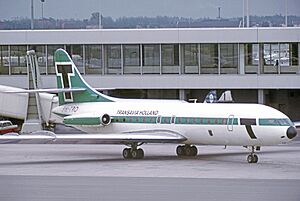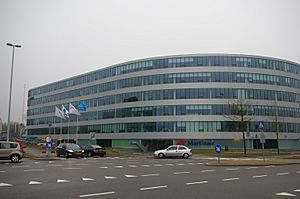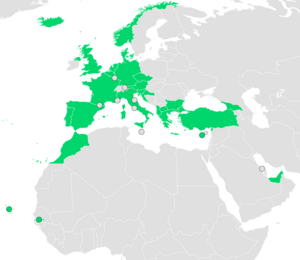Transavia facts for kids
| Commenced operations | 17 November 1966 |
|---|---|
| Operating bases |
|
| Frequent-flyer program | Flying Blue |
| Fleet size | 47 (2024) |
| Destinations | 96 |
| Parent company | Air France-KLM |
| Headquarters | Haarlemmermeer, Netherlands |
| Key people | Marcel de Nooijer (CEO). |
| Revenue | |
| Operating income | |
Transavia is a Dutch airline that offers flights at lower prices. This type of airline is called a low-cost airline. It is owned by KLM, the main airline of the Netherlands, which is part of the larger Air France–KLM group.
Transavia's main airport, or base, is Amsterdam Airport Schiphol. It also has bases at Rotterdam The Hague Airport and Eindhoven Airport. This means many of its planes and crew start and end their trips at these airports.
Contents
The Story of Transavia
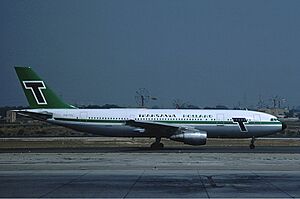
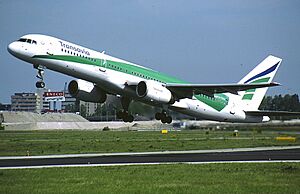
How It All Began
Back in 1966, a few people had an idea to start a new airline in the Netherlands for holiday travel. They bought a small, inactive company called Transavia Limburg which already had three planes.
To start flying from Amsterdam, they needed permission from the Dutch government. A man named John Block helped get the license. On November 17, 1966, just a few days after getting permission, Transavia made its first flight. It flew from Amsterdam to Naples, Italy, and back, carrying a Dutch orchestra and dance group. The airline was then called Transavia Holland.
The new company set up its offices in Hangar 7 at the old Schiphol Airport. The first team included pilots, a chief flight attendant, and six carefully chosen flight attendants. In 1969, Transavia started using its first jet airplanes, the Sud Caravelle.
Growing and Changing
Ten years after it started, Transavia was a big player in the Dutch holiday travel market. It became the main competitor for another Dutch airline, Martinair. In 1986, the airline changed its name from Transavia Holland to Transavia Airlines.
That same year, Transavia became the first airline to use a new "open skies" agreement between the Netherlands and the United Kingdom. This agreement made it easier for airlines to fly between the two countries. On October 26, 1986, Transavia started its first regular, scheduled flight route between Amsterdam and London's Gatwick Airport.
In 1991, the Dutch airline KLM bought most of Transavia. By 2003, KLM owned 100% of the airline. When KLM later joined with Air France, Transavia became part of the big Air France-KLM group.
For a while, Transavia also had a separate low-cost airline called Basiq Air. In 2005, they were combined into one brand called transavia.com to make the company's name stronger.
By 2015, the airline updated its look. It dropped the ".com" from its name and changed its main colors to white and green. Today, Transavia is the main low-cost airline for Air France-KLM in both the Netherlands and France.
Recent Times
Like many airlines, Transavia faced challenges during the worldwide travel slowdown in 2020. But as people started to travel again, the airline began to recover.
In December 2021, Air France-KLM placed a large order for new airplanes from the Airbus A320neo family. These new, modern planes are for Transavia and its sister airlines. The first of these new jets, an Airbus A321neo, was delivered in December 2023 and started flying for Transavia soon after.
Company Information
Main Office and Ownership
Transavia's head office is in a building called the "TransPort Building" at Amsterdam Airport Schiphol.
The airline is fully owned by KLM, which is part of the Air France-KLM group. Even though it's owned by a larger company, Transavia operates as its own independent airline. There is also a French airline, Transavia France, which uses the same name and business style.
How Transavia Works
Transavia is a low-cost carrier. This means it focuses on offering cheaper tickets. To do this, it has one class of seating on its planes.
Passengers can buy food and drinks on the plane from a menu. Also, while a small carry-on bag is usually free, passengers have to pay extra to check in larger bags that go in the plane's cargo hold. This helps keep the ticket prices low for everyone.
Where Does Transavia Fly?
Transavia flies to many destinations, mostly in Europe and around the Mediterranean Sea. These are popular spots for holidays and city trips.
Transavia has special partnerships called codeshare agreements with a few other airlines. This means that an airline like KLM or Air France can sell tickets for a Transavia flight under its own name. It helps passengers connect more easily between different airlines. Transavia has these agreements with:
Transavia's Fleet of Airplanes
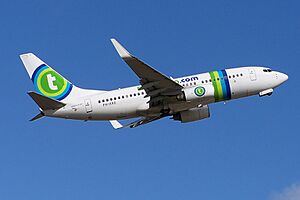
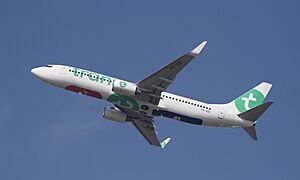
Current Airplanes
As of July 2025, Transavia in the Netherlands uses the following aircraft:
| Aircraft Type | In service | Orders | Passengers | Notes |
|---|---|---|---|---|
| Airbus A320neo | — | 33 | 186 | Part of a large order shared with KLM and Transavia France. These will replace the Boeing 737-800 planes. |
| Airbus A321neo | 12 | 232 | ||
| Boeing 737-800 | 40 | — | 189 | These planes are being replaced by the new Airbus A320neo family aircraft. |
| Total | 51 | 31 | ||
New Planes on the Way
For a long time, Transavia mostly used planes from the Boeing 737 family. However, in 2021, its parent company, Air France-KLM, announced a big change. They ordered up to 160 new planes from the Airbus A320neo family.
These new Airbus jets will replace all the older Boeing 737s at Transavia, as well as at Transavia France and KLM. This is a major step to make the airline's fleet more modern and fuel-efficient.
Past Airplanes
Over the years, Transavia has flown many different types of planes. Here are some of the aircraft that were once part of its fleet:
|
Safety and Incidents
Transavia has a good safety record, and no one has ever been fatally injured on any of its flights. However, there have been a few incidents where a plane was damaged but everyone was safe.
- On February 8, 1997, a part in the tail of a Boeing 737 broke while it was flying from Salzburg to Amsterdam. This damaged the plane's rudder, which helps it turn. The pilots made a safe emergency landing in Nuremberg, Germany. No one was hurt.
- On December 24, 1997, a Boeing 757 was landing in Amsterdam in very strong and gusty winds. The plane landed hard, and its front landing gear collapsed. The plane slid for about 3 kilometers before stopping safely next to the runway. Everyone was evacuated without any serious injuries. The aircraft was repaired and flew again.
See also
 In Spanish: Transavia para niños
In Spanish: Transavia para niños
- Transavia Denmark
- Transavia France
 | Bessie Coleman |
 | Spann Watson |
 | Jill E. Brown |
 | Sherman W. White |


